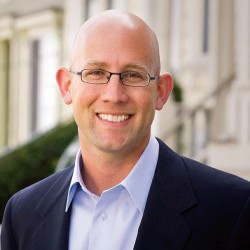 Progressive San Francisco has been mourning the untimely death of Eileen Hansen on April 29. Her passing is a tremendous loss. AIDS activist and nonprofit leader, two-time Supervisor candidate, Ethics Commissioner, co-founder of Friends of Ethics, she brought boundless energy and integrity to every cause and fight. She was also kind. I relied on Eileen to explain local ethics issues and proposed reforms to me, but even more, I relied on her as an ethical compass generally. Eileen was one of the more principled people I have encountered during my years in San Francisco politics; on those few occasions when I found myself not agreeing with her on a candidate or issue, I knew that I needed to think carefully about how and why I had landed where I had. I will miss Eileen’s counsel and her friendship. She was one of the best ones.
Progressive San Francisco has been mourning the untimely death of Eileen Hansen on April 29. Her passing is a tremendous loss. AIDS activist and nonprofit leader, two-time Supervisor candidate, Ethics Commissioner, co-founder of Friends of Ethics, she brought boundless energy and integrity to every cause and fight. She was also kind. I relied on Eileen to explain local ethics issues and proposed reforms to me, but even more, I relied on her as an ethical compass generally. Eileen was one of the more principled people I have encountered during my years in San Francisco politics; on those few occasions when I found myself not agreeing with her on a candidate or issue, I knew that I needed to think carefully about how and why I had landed where I had. I will miss Eileen’s counsel and her friendship. She was one of the best ones.
Were she still with us, I am pretty sure Eileen would be doing everything she could to elect the Reform Slate to the Democratic County Central Committee, or DCCC. Already, as of this writing, the DCCC candidates have raised nearly $1,000,000 in what has turned into a pitched battle for control of the local Democratic Party. The DCCC, readers may recall, gets to decide the Democratic Party endorsements in local races, and in a presidential election year, that imprimatur actually matters quite a bit. And readers may also recall that since 2012, the more conservative faction of the local Party has had the upper hand on the Committee, a hand that has been strengthened as the pro-business majority has filled new vacancies with like-minded folks. Of course, this is San Francisco, and so the differences between the factions are usually minimal or non-existent on most social issues (police accountability would be a notable exception), but the differences on economic issues (e.g., housing, land use, taxation) are significant.
This year, both the progressives and the business Democrats are pulling out all the stops to elect their respective slates. The latter group have even dusted off and reused a theme that I thought was long-past resonance: in mailers and newspaper stories, the business Dems have taken to warning voters darkly about the return of the so-called “Peskin Machine.” Now the first problem with the message is that it’s just not true. I was there for many of the meetings where the Reform Slate came together, and so were a number of other folks, including Peskin. The Reform Slate isn’t Aaron’s any more than it’s Tom Ammiano’s or Jane Kim’s or David Campos’. But setting truthfulness aside (this is politics after all), I cannot imagine that the anti-Peskin message, which by the way was used against me in my race for Supervisor in 2010, is particularly salient today. After five years of landlords, developers and other industry types pretty much having the run of City Hall, I think a lot of San Franciscans were relieved to see Aaron heading back to the Board of Supervisors in January and have appreciated the independence of the new Board majority since he joined. Those voters may not hate the idea of a similarly independent Democratic Party. We’ll find out June 7.
I wish I had better news from City College. The faculty carried out a one-day strike on April 27, and as one would expect in a labor town like San Francisco, received significant support from elected leaders and everyday community folks alike. And yet … the two sides remain far apart on the core issue of compensation. The union is understandably focused on getting a fair deal for its members that allows them to survive in an increasingly unaffordable Bay Area. The administration is also correctly focused on saving the College and ensuring that it can survive the imminent all-but-certain loss of more than twenty million dollars in State funding. That budgetary hit—the College’s very own fiscal cliff—results from the steep decline in enrollment since the accreditation crisis began in 2012 and the expiration of stabilization funding Mark Leno had secured to partially shield the College from the significant cuts that, but for his legislation, would already have hit. A fact-finding process begins later this month, and I think everyone is hoping that a neutral fact-finder can move the two sides together, as it seems to have done in the CSU situation. One thing most everyone agrees on: continued labor strife will be bad for the College. It will depress enrollment in the critical 16–17 year that will establish the new base for State funding, it will make it harder to pass a parcel tax measure on the November ballot and it will continue to divert the institution’s attention and resources from a number of other urgent needs.
Rafael Mandelman is an attorney for the City of Oakland. He is also President of the City College of San Francisco Board of Trustees.
Recent Comments